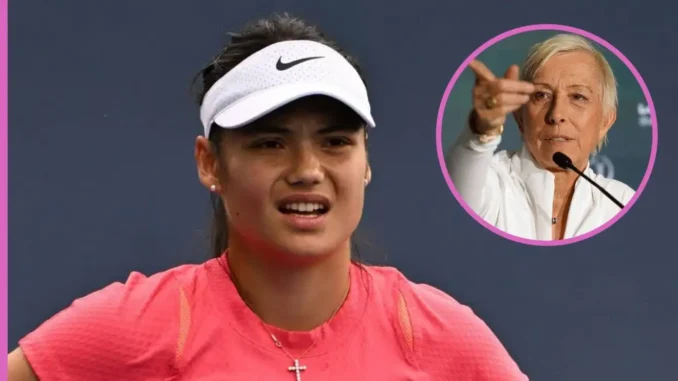
As the Miami Open unfolded under the Florida sun in late March 2025, the tennis world turned its eyes to Emma Raducanu, the 22-year-old British sensation whose quarterfinal run at the Hard Rock Stadium reignited hopes of a grand resurgence. On this balmy Thursday evening, March 27, her journey came to an end against the formidable Jessica Pegula, ranked No. 4 in the world, in a gripping three-set battle—6-4, 6-7 (3-7), 6-2. Yet, despite the defeat, Raducanu’s performance drew a bold prediction from tennis legend Martina Navratilova, who sees the former US Open champion climbing back into the elite ranks of the WTA, potentially as high as the top 30, if she can maintain her health and momentum.
Raducanu’s Miami campaign was a rollercoaster of grit and brilliance, a stark contrast to the rocky start of her 2025 season. After battling injuries, a coaching shakeup, and even a harrowing stalking incident earlier in the year, she arrived in Miami ranked No. 60, her confidence seemingly fragile. But the Sunshine State proved to be her proving ground. She kicked things off with a commanding win over Japanese qualifier Sayaka Ishii, then stunned the tennis world by toppling No. 8 seed Emma Navarro in a three-hour epic—her first hard-court victory against a top-10 player. The momentum carried her past McCartney Kessler and No. 17 seed Amanda Anisimova, propelling her to the quarterfinals of a WTA 1000 event for the first time. It was a run that echoed the magic of her 2021 US Open triumph, a reminder of the raw talent that once shocked the sport.
Against Pegula, Raducanu showcased her fighting spirit. Down a set and trailing in the second, she summoned some of her finest tennis since that fairy-tale New York run, clawing back to a 5-2 lead with four set points in hand. But the Miami humidity—hovering at 70 percent—took its toll. “I just felt really dizzy,” she confessed afterward, her voice tinged with exhaustion. “I felt faint.” A medical timeout followed, with ice towels and a blood pressure check offering a brief respite. Against all odds, she rallied to win the set in a tiebreak, forcing a decider. Pegula, however, proved too steady, her experience shining through as she sealed the match in the third. “I’m really proud of how I fought,” Raducanu said, her words reflecting both disappointment and determination. “Jessica played a really good match from start to finish and just showed her class and levels at the end.”
Navratilova, an 18-time Grand Slam singles champion, watched the drama unfold and saw something special. “If she stays healthy and plays this well, then she’ll be seeded at Roland Garros,” she predicted with conviction, her voice carrying the weight of decades in the sport. “I think she’ll move up the ranking well enough into the top 30. The biggest question mark is her health.” It’s a bold call, but not without basis—Raducanu’s Miami exploits will see her vault 12 spots to No. 48 in the WTA rankings when they update, a tantalizing step toward the top 50 and beyond. Navratilova also pointed to the chaos in Raducanu’s coaching setup as a hurdle to overcome. “Hopefully she can sort out her coaching situation because she’s been in a state of flux,” she added, urging the young star to find stability off the court to match her on-court potential.
The match itself was a spectacle of resilience. Raducanu’s serve, once a liability plagued by double faults, held firm—no doubles against Pegula, with a 70 percent first-serve rate. “It was amazing,” Navratilova marveled, recalling how Raducanu looked spent at the end of the second set yet somehow pushed through. “The way she looked, you think this match is over, and somehow she won the set, she won the tiebreak, and still competed in the third.” She suggested the dizziness might have stemmed from stress rather than just the weather, noting the late finish past 11 p.m. in cooler conditions. “The humidity takes it out of you a lot, but still—this was something more for Emma, and it’s just amazing that she finished the match.”
For Raducanu, Miami was a turning point, a week where she rediscovered her competitive fire. “Despite losing today, I can take some good positives from this week,” she said, her optimism shining through. “It wasn’t easy, and I played some really good tennis to get here.” With no full-time coach after parting ways with Vladimir Platenik just before the tournament, she leaned on familiar faces like Mark Petchey and Jane O’Donoghue, a setup that allowed her to play with authenticity. As she heads to the clay season and a Billie Jean King Cup tie in the Netherlands, Navratilova’s prediction looms large—a top-30 return is within reach, if only the stars of health and stability align for this British star on the rise.
Leave a Reply